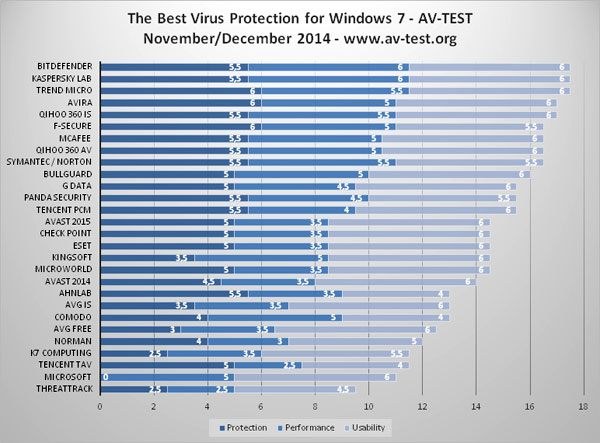Microsoft Flunks Antivirus Tests. Who Aced Them?
AV-TEST put Windows antivirus programs through their paces. Microsoft Security Essentials came in nearly last. Here's who was first.


Every antivirus software package promises to protect your computer from danger, but when it comes to detecting malware, there are huge differences among them. German Lab AV-TEST today (Jan. 22) released the results of its latest Windows 7-based tests, and Microsoft's free Security Essentials application came in near the bottom, while paid packages from Bitdefender, Kaspersky Lab and Trend Micro were tied at the top.
It's common knowledge among computer-security professionals that Microsoft Security Essentials and its Windows 8 counterpart, Windows Defender, are terrible at detecting malware. Microsoft itself has said that the two are meant only to be stopgap solutions to confer some degree of herd immunity on Windows users who refuse to install third-party antivirus software.
MORE: Best Antivirus Software and Apps 2015
Just under the top three were Avira, best known for its free antivirus software, and Qihoo, a Chinese antivirus maker, which each scored 17 out of 18 possible points. The products by the better-known Bitdefender, Kaspersky Lab and Trend Micro got 17.5 points each. Avira actually scored better in the malware-protection category than either Bitdefender or Kaspersky; like the offering from Trend Micro, it got a perfect 6 in stopping viruses, worms, Trojans and other malware.
Twenty-eight products in all were tested on Windows 7. They were scored on how well each detected 153 pieces of newly discovered "zero-day" malware and 12,327 pieces of malware that had been discovered in the previous four weeks.
To be specific, the top three scorers were Bitdefender Internet Security, Kaspersky Internet Security and Trend Micro Internet Security, all of which have a list yearly subscription price of $60 for one user and $80 for three users, although discounts can often be found online. (Each company makes several antivirus products.) Avira Antivirus Pro is cheaper, at about $35 list for one user (it's priced in euros), while Qihoo 360 Internet Security is completely free.
Only Trend Micro was able to catch 100 percent of both kinds of malware. Avira and Kapersky snagged 99 percent of the zero-day malware, compared to the 97 percent detected by Bitdefender and Qihoo 360 (according to Qihoo, both use the same malware engine). All four blocked 100 percent of the older malware.
Get instant access to breaking news, the hottest reviews, great deals and helpful tips.
Slightly underperforming the top ranks were the offerings from the big American antivirus firms. McAfee Internet Security and Norton Security each scored 16.5, with the first doing slightly better on performance, the second slightly better on usability. Both scored a healthy 5.5 on protection; Norton got 99 percent of zero-day malware compared to McAfee's 93 percent, but McAfee found all the older malware samples, while Norton only got 99 percent of those.
Differences between a few percentage points in the 90s may not sound like much, but it's what's left over that really counts. A 97-percent detection rate will let three times as much malware come over the castle walls as would a 99-percent detection rate.
Tied with McAfee and Norton for third-highest score were F-Secure Internet Security, which scored a perfect 6 in malware protection yet suffered a bit in performance and usability, and Qihoo 360 Antivirus, a separate product from Qihoo 360 that's available only in China.
Rounding out the top 10 highest-scoring products was Bullguard Internet Security, which scored a solid 16 out of 18.
On the other end of the spectrum were Microsoft Security Essentials, which got zero out of 6 in the protection category (it detected only 49 percent of zero-day malware) yet still scored 11 points thanks to its ease of use and low system impact, and ThreatTrack's VIPRE Internet Security. VIPRE found 76 percent of zero-day malware, yet did poorly on performance and usability; it scored 9.5 out of 18 and came in dead last.
- 5 Worst Security Fails of 2014
- 12 Computer-Security Mistakes You're Probably Making
- 10 Facebook Privacy and Security Settings to Lock Down
Paul Wagenseil is a senior editor at Tom's Guide focused on security and gaming. Follow him at @snd_wagenseil. Follow Tom's Guide at @tomsguide, on Facebook and on Google+.

Paul Wagenseil is a senior editor at Tom's Guide focused on security and privacy. He has also been a dishwasher, fry cook, long-haul driver, code monkey and video editor. He's been rooting around in the information-security space for more than 15 years at FoxNews.com, SecurityNewsDaily, TechNewsDaily and Tom's Guide, has presented talks at the ShmooCon, DerbyCon and BSides Las Vegas hacker conferences, shown up in random TV news spots and even moderated a panel discussion at the CEDIA home-technology conference. You can follow his rants on Twitter at @snd_wagenseil.
-
morerice How was this list compiled? Was this based on the most popular anti-virus program on the market?Reply -
Paul Wagenseil Antivirus companies submit their products for AV-TEST to evaluate. I don't believe it's based on how each product sells. You can see the full list, and the full results, here: http://www.av-test.org/en/antivirus/home-windows/windows-7/december-2014/Reply
-
socalboomer makes me suspicious when Norton ranks so high. We've been close to taking it off our approved antivirus list (for campus resident students) for quite some time due to it being so problematic. And then seeing ESET so low. . . smells fishy. Never been a fan of av-test. My own testing has never lined up even close to their results. . .Reply -
johnbl anti virus company pays AV-TEST to produce a report and may even provide the test cases . The reports are rigged (carefully selected tests). Microsoft does not pay them.Reply
read the AV-TEST terms and conditions on their web site -
Dilettante_II Bit-defender is practically malware in its own right. They use deceptive registration forms so the user unknowingly agrees pay registration fees in perpetuity. You have to contact them to stop paying.Reply
I found Bit-defender heavily lagged my system (unacceptably so). It also didn't uninstall properly - leaving an application which served as spyware to monitor your system. -
Puiucs @Dilettante Bitdefender is the best antivirus you can get right now and everybody agrees. The paying problem you had does not exist. You can cancel subscriptions easily and while it's performance isn't amazing compared to the more lightweight solutions out there, you can heavily modify it's configuration to personalize it.Reply
If you want just stick to the free version of avira. You don't seem the type who needs amazing protection. -
Dilettante_II @Puiucs I'm saddened you would dismiss my experiences so readily - and so aggressively.Reply -
dgingeri With the trouble I'd had with BitDefender over the last 5 years, I've already moved away from them. The latest problem I had was it would hang one core on my processor at 100% usage that hold the whole processor at max speed. It was killing my power bill. The previous incidents of identifying OS files as viruses and removing them, rendering the machine unbootable, were a significant annoyance, too.Reply -
DownwithEA I'm a bit skeptical of this review. Walk into any tech service center and ask them which antivirus program is most commonly installed on infected systems. Guarantee first words out of their mouths are McAfee, Norton & AVG. Maybe these are just more commonly installed. However, from personal experience in a tech room I can say that I didn't see one PC brought in for virus removal with Security Essentials on it. Granted this was a while ago.Reply
